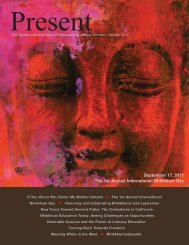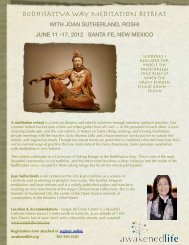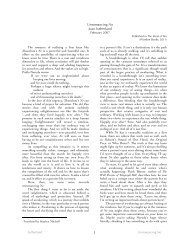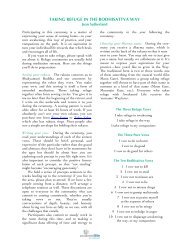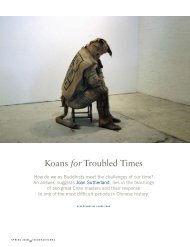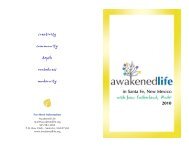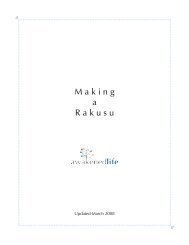Gaining Perspective - Awakened Life
Gaining Perspective - Awakened Life
Gaining Perspective - Awakened Life
- No tags were found...
You also want an ePaper? Increase the reach of your titles
YUMPU automatically turns print PDFs into web optimized ePapers that Google loves.
(Opposite)Untitled, 2008by Cathy Daley<strong>Gaining</strong> <strong>Perspective</strong>When you’re caught in your habitual patterns, saysJoan Sutherland, try not to fixate on your reactions.Instead cultivate awareness of everything that ishappening in the moment.Sometimes it can seem as though being human is a problemthat spiritual practice is meant to solve. But Buddhistmeditative and related practices actually have adifferent focus: developing our human faculties to see moreclearly the true nature of things, so that we can participate inand respond to how things are in a more generous and helpfulway. Our individual awakenings become part of the world’sawakening. This means leaning into life, and to do that wehave to recognize what gets in the way. For each of us, thisis likely to include certain habitual patterns of thinking andfeeling in reaction to what we encounter.Meditation and inquiry are methods, ways to have directexperiences of the deepest insights of our tradition—of theinterpermeation of all things and the way things, including ourhabitual reactions, rise into existence for awhile and then fallaway again. Everything is provisional, and everything influenceseverything else. The implication for our inner lives isthat they are seamless with the outer world, and constantlychanging with it. We’re not encapsulated consciousnessesbouncing around in a world of other consciousnesses and inertmatter, but part of a vibrant, ever-changing field that encompasseseverything we can experience, and more. Everything isrising and falling in this field, sometimes for a nanosecond andsometimes for a geological age, but still appearing and disappearingin an infinitely complex webof other things doing the same. To theextent that we experience, in the ordinarymoments of our lives, the seamlessnessof our inner states and outerJoan Sutherland, Roshi is a Zen koan teacher andthe founder of <strong>Awakened</strong> <strong>Life</strong> in Santa Fe, NewMexico.circumstances, we’re being more realistic, more in tune withthe way things actually are.From this perspective, how do we deal with the habitualpatterns of heart and mind that inhibit us from having a morerealistic understanding of life, and a more intimate engagementwith it? Perhaps it becomes less important to tackle thethoughts and feelings directly, to do something about them,than it is to see them in their true proportion. A reaction,after all, is just one thing among many appearing in the fieldat that particular moment, no more or less important thananything else.Simply put, how we react is not the most important elementof any situation. When we fixate on our reactions, theypull us away from a primary experience of what’s actuallyhappening, into a small room where how we think and feelabout the experience becomes the most important thing, thething we’re now in relationship with. If you and I are having aconversation and I become angry, I might find my emotions socompelling that suddenly I’m not in a conversation with youanymore, but with my anger. What’s wrong with this person?This must not stand! Then, particularly if I’m involved in aspiritual practice, I’m likely to have reactions to my reactions.After all this meditation, I shouldn’t be getting angry like this!Or, This is righteous anger! Now I’m in the third order ofexperience, moving further and further away from the actualconversation with you.If we pull the camera back for a wider view, it’s immediatelyapparent that a reaction like this is only one of manythings rising in any given moment in the field. There’s youand me and our surroundings, your mood, my capacity formisunderstanding, the temperature of the air, the sound ofbirds or traffic outside the window and the neighborhoodbeyond that, the most recent calamity in the news, and moreother phenomena than we can possibly take into account.The moment is vast, with a lot of space between the thingsin it. The moment is generous. I don’t have to zero in on myreaction, to act impulsively on it or repudiate it or improve it,all of which tend to reinforce the sense of its importance, butjust accept it as one (small) part of what’s happening. Usuallythat simple shift changes everything. It allows us to step outof the small room of second-order experience and back intoa fuller, more realistic experience of the moment.Margo Conoverbuddhadharma: the practitioner’s quarterly summer 2011 32




